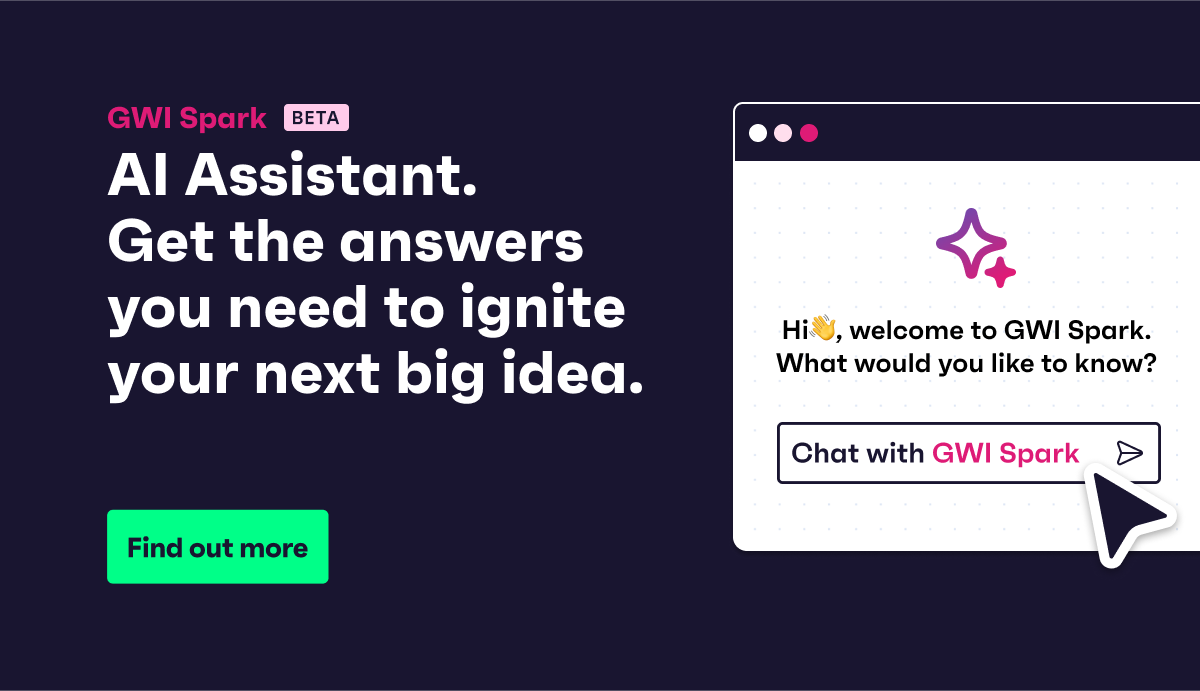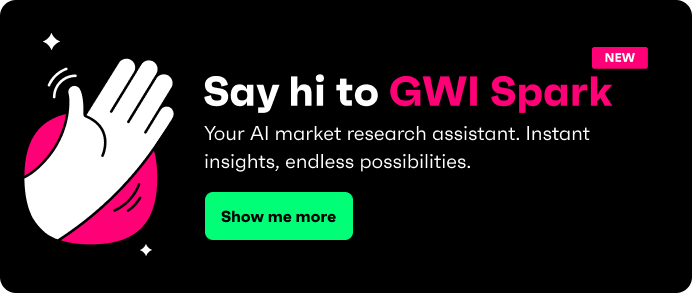
Unless you’ve been stranded on a desert island for the last few years you’re probably aware that AI market research tools are transforming the way businesses uncover and interpret consumer behavior.
The ability to streamline complex processes, analyze vast datasets, and deliver actionable insights in real time mean these tools are the smart way to hunt for opportunities, track brand performance, and predict future trends.
But in such a fast moving area with so many options, where do you start? In this blog, we explain what AI market research is all about, outline its key advantages, and showcase 15 top tools you can start using today.
- What is AI market research?
- What can I use AI market research tools for?
- How exactly can AI market research tools help me?
- How GWI is leveraging AI in market research and consumer insights
- 15 top AI market research tools to consider
- GWI Spark
- Quantilope
- Brandwatch
- Morning Consult
- Browse AI
- Zappi
- Hotjar
- Appen
- YouScan
- Crayon
- Perplexity AI
- SurveyMonkey Genius
- Speak AI
- Market Insights AI
- ChatGPT
- How to choose the right AI market research tool
- Key takeaways
- AI market research tools FAQ
What is AI market research?
AI-powered market research uses advanced technologies like machine learning, natural language processing, and predictive analytics to help companies find the right consumer insights.
By automating time-consuming or challenging tasks, AI makes market research smarter, faster, and more scalable. From understanding audience behaviors to analyzing brand sentiment, the result helps businesses to make rock-solid, data-driven decisions.
What can I use AI market research tools for?
The short answer is, pretty much anything; from collecting your own data, to tapping into 3rd party insights, there’s a tool for every task. That said, there are a handful of key areas where AI-powered market research tools really shine:
- Survey automation: Streamline your research with tools that design, distribute, and analyze surveys in real time, saving time and manual effort.
- Trend analysis: Analyze historical and live data to predict consumer behavior and market movements with unrivaled accuracy.
- Sentiment analysis: Understand public opinion by evaluating consumer sentiment across social media, forums, and other digital spaces.
- Competitive intelligence: Track competitors’ strategies, pricing, and performance to uncover opportunities and stay ahead.
- Data visualization: Transform raw data into dynamic charts and dashboards, making insights easier to understand and share.
Whether you’re a marketer looking for audience insights or a strategist mapping the competitive landscape, the range and versatility of AI market research tools means there’s likely to be an option to address your specific research challenge.
How exactly can AI market research tools help me?
So far we’ve looked at what AI market research is all about and where it’s useful; now let’s look at the benefits. Broadly speaking, AI market research tools are great for:
- Speed: Automated processes help streamline the collection and analysis of data, delivering insights faster than traditional methods.
- Scalability: These tools are designed to handle huge datasets, making them a valuable asset for businesses operating across multiple markets.
- Predictive insights: AI can help identify emerging trends and anticipate consumer behaviors, giving you the foresight you need to stay competitive.
- Team Efficiency: By automating repetitive tasks, AI frees up research teams to focus on high-priority projects that require strategic thinking and human expertise.
It’s worth pointing out that while these advantages make AI tools an incredibly powerful addition to research workflows, their ultimate value depends on how well they’re integrated into existing processes and paired with human expertise. That’s when the magic really starts to happen.
How GWI is leveraging AI in market research and consumer insights
Admittedly we’re a little biased here, but bear with us. GWI Spark, our AI research assistant, is transforming how users uncover insights, connecting them to real survey data from nearly a million consumers so they get the reliable insights they need to ignite their creativity and guide their next move.
At the heart of this is a friendly, familiar chat function; you ask a question, and GWI Spark instantly gives you tailored insights – simple as that.
By enabling users to ask questions in everyday language and get bespoke insights on demand, GWI Spark massively simplifies the whole process of uncovering audience behaviors, identifying trends, and crafting strategies, making it ideal for non-experts.
Add to that interactive visualizations and an intuitive interface, and users can explore even the most complex topics with confidence. The result is accurate, reliable insights that support faster, smarter, decisions based on evidence not guesswork.

15 top AI market research tools to consider
1. GWI Spark
We’ve already introduced GWI Spark and explained how it delivers instant insights and endless opportunities, exactly when you need them.
Another important reason to choose GWI Spark is the data it runs on. Unlike tools that rely on external or inconsistent data sources, GWI Spark is fueled exclusively by GWI’s ultra-robust global survey data, the result of monthly surveys of almost a million real life, flesh-and-blood, individuals in over 50 world markets. Every insight is built on a solid foundation of accuracy and reliability, giving you the confidence to make informed, data-driven decisions.
Key features
GWI Spark’s intuitive, chat-based interface allows you to interact seamlessly with the data. Start a conversation, explore insights in real time, and take your analysis further by generating customizable charts, pinning key findings, or diving deeper into areas of interest.
By transforming data into actionable insights, GWI empowers businesses to strategize effectively and move forward with confidence.
Use cases
GWI Spark is perfect for professionals who don’t consider themselves data experts - for example sales teams or marketing strategists - helping them unlock actionable insights tailored to their goals so they can make smarter decisions. Areas where GWI Spark really scores include:
- Pitching and winning new business: Sales teams can tap into instant insights about audience preferences and buying triggers, helping them craft data-backed pitches even under tight deadlines.
- Content marketing: Copywriters and strategists can explore quick insights into their audience’s concerns and values - like mindfulness or sustainability - to create campaigns that really resonate, and back up their blog articles with up-to-date stats about real people.
- Partnership opportunities: Brands can identify potential strategic partners by analyzing consumer trends and preferences, enabling collaborations that drive growth and unlock new opportunities.
- Product positioning and strategy: Product marketers can uncover market gaps, validate go-to-market strategies, and align product features with user needs to stay ahead of the competition.
Why choose GWI Spark?
Simple: GWI Spark offers unmatched clarity, certainty, and functionality for on-demand market research. It’s ideal for anyone looking to:
- Validate decisions with data-driven insights
- Explore audiences interactively and visually
- Save time while maintaining complete accuracy
Whether you’re pitching ideas, crafting campaigns, or developing products, GWI Spark ensures your strategies are rooted in insights that matter.
2. Quantilope
Quantilope helps teams speed up survey creation, simplify data analysis, and unearth predictive insights by integrating AI into its research platform. By having these tools act as a co-pilot for researchers, study design is easier, and interpreting findings and delivering actionable results is much more efficient.
Features
Quantilope's platform streamlines the research process by automating survey design and reporting, providing insights through advanced analytics, and offering predictive modeling tools to help researchers forecast trends with precision.
Use cases
Commonly used for product testing, brand health monitoring, and campaign evaluation, its speed and flexibility make it a good choice for iterative research.
3. Brandwatch
Brandwatch’s Iris AI specializes in social media listening and consumer sentiment analysis. It’s designed to help businesses track their online reputation and monitor brand perception.
Features
Brandwatch leverages advanced AI to unlock real-time sentiment analysis from millions of online posts, helping businesses stay attuned to public opinion. It uncovers emerging trends and topics, while seamlessly integrating with visualization platforms to ensure insights are presented in clear, impactful reports.
Use cases
Brandwatch is ideal for monitoring brand reputation, competitive analysis, and planning social media strategies.
4. Morning Consult
Morning Consult AI works on analyzing public opinion and sentiment. Its AI features allow businesses to understand current consumer preferences at scale.
Features
Morning Consult's AI processes huge amounts of survey data, providing detailed demographic breakdowns and trend forecasts. Its user-friendly dashboards make insights accessible to non-technical team members.
Use cases
It’s commonly used for political polling, consumer confidence analysis, and brand tracking.
5. Browse AI
Browse AI specializes in web scraping to collect market data from various online sources. Its intuitive setup makes it accessible even for teams without any technical expertise.
Features
Browse AI automates data extraction, capturing product prices, customer reviews, and competitor information. It also seamlessly integrates with analytics platforms for quick and easy reporting.
Use cases
Competitive benchmarking, ecommerce optimization, and tracking industry trends are the most common reasons brands use this tool.
6. Zappi
Zappi uses AI to create fast, actionable reports tailored to individual research needs. Its platform supports a range of items from concept testing to ad performance evaluation.
Features
Zappi’s AI Quick Reports summarize key findings in seconds, saving researchers hours of manual work. The platform also has tools for audience targeting and creative testing.
Use cases
Evaluating campaign effectiveness, testing new product concepts, and exploring customer preferences.
7. Hotjar
Hotjar pulls together behavioral analytics and AI to offer insights into user experiences. Its AI-driven surveys and heatmaps provide useful feedback for optimizing digital platforms.
Features
Hotjar uses AI surveys, session recordings, and heatmaps to visualize user interactions. It also highlights friction points, enabling teams to boost overall site performance, as well as individual page performance.
Use cases
Hotjar is especially useful for UX designers, product managers, and digital marketers looking to strengthen user experiences.
8. Appen
Appen specializes in data for machine learning and AI models, making it a necessary part of the toolkit for businesses that rely on high-quality datasets. Its capabilities include training AI models and delivering bespoke datasets for market research.
Features
Appen provides top-quality, annotated datasets tailored for machine learning applications. With a global reach, it collects data from diverse markets to ensure wide applicability. It also offers tools for speech recognition, computer vision, and natural language processing model training.
Use cases
Businesses use Appen to enhance machine learning models with accurate and comprehensive datasets. Annotated data from Appen boosts performance for AI algorithms in market research. Companies also make use of its services to amass demographic-specific data for targeted insights.
9. YouScan
YouScan is a social media listening tool that uses AI to analyze consumer-generated content and pick out key trends. Brands can use it to understand online conversations, making it a useful tool for sentiment analysis and market trend discovery.
Features
YouScan makes use of AI-driven image recognition to analyze visual content, offering a unique edge in understanding consumer-generated media. It also tracks social media trends and brand mentions, ensuring businesses stay updated, and offers sentiment analysis across multiple platforms to easily gauge consumer opinions.
Use cases
Brands can use it to monitor their reputation and sentiment on social media platforms. It also helps them to identify emerging consumer trends from user-generated content, so they can stay ahead of the curve. It also tracks and analyzes online conversations about competitors so brands can benchmark against them.
10. Crayon
Crayon gathers and analyzes competitive intelligence by using AI to provide businesses with a clear picture of their industry landscape.Organizations can track competitors’ strategies and adapt accordingly.
Features
Crayon tracks competitor activities, including pricing updates, campaigns, and messaging. Its AI-powered insights offer a detailed view of market dynamics and industry positioning. It also has tools brands can use for competitive benchmarking and identifying new business opportunities.
Use cases
Crayon can be used to monitor competitor website updates and marketing strategies, to keep brands informed of industry changes. It’s also great at analysing pricing trends to support strategic decisions. Companies also rely on Crayon when it comes to tracking shifts in customer behavior and understanding market dynamics for better positioning.
11. Perplexity AI
Perplexity AI is an advanced AI-powered assistant that makes research processes simpler by delivering concise, factual summaries from huge datasets.
Features
Perplexity AI uses natural language processing to make it easier to explore and query datasets. It provides succinct, fact-based answers for complex research queries. Perplexity AI also integrates seamlessly with users’ existing workflows to boost efficiency and collaboration.
Use cases
Researchers can use it to quickly summarize huge datasets and streamline time-sensitive projects. It’s a great tool for exploring consumer behavior trends through direct querying. Businesses also use it to simplify data analysis and speed up decision-making.
12. SurveyMonkey Genius
SurveyMonkey Genius makes use of AI to design smarter surveys and analyze responses more efficiently. It automates feedback analysis and pulls out important insights for decision-makers.
Features
SurveyMonkey Genius provides AI-powered tips for writing survey questions to boost respondent engagement. It automates the analysis of survey results, and delivers actionable insights with minimal manual input. The platform also integrates with CRM and marketing tools, so brands get seamless data utilization.
Use cases
SurveyMonkey Genius can be used to create engaging surveys that improve response rates and data quality. It analyzes feedback to uncover pain points and spot growth opportunities. The platform also streamlines survey data integration into larger research workflows to enhance productivity.
13. Speak AI
Speak AI combines AI with speech and text analysis to give detailed consumer insights. It works well for analyzing interviews, focus groups, and other qualitative data.
Features
Speak AI is useful for automating the transcription and analysis of audio and video data, improving efficiency and accuracy. Its AI-powered sentiment analysis tools provide qualitative insights by picking up on themes and emotional tones. It also has custom reporting features, making it simple to present findings to stakeholders.
Use cases
Speak AI can be used to analyze customer interviews, uncover sentiment and recurring themes. It also helps with transcribing and evaluating focus group discussions, and gives actionable insights. Speak AI also creates comprehensive qualitative reports for strategic decision-making.
14. Market Insights AI
Market Insights AI automates the collection and analysis of market data to deliver bespoke insights for businesses to action. It focuses on identifying key trends and assessing market opportunities.
Features
Market Insights AI automates data scraping and analysis for detailed market research. Its predictive analytics tools identify trends and opportunities, so brands can be more proactive with their decision-making. The platform also delivers bespoke insights based on industry-specific needs and the business’ objectives.
Use cases
Market Insights AI conducts competitive analysis in specific markets to help brands gain a deeper understanding of their landscape. It tracks industry trends, informs long-term strategies, and helps identify new product development and innovation opportunities.
15. ChatGPT
Last but very much not least, ChatGPT. It’s an AI-powered conversational assistant that works on market research tasks through natural language interaction. It works on everything from data analysis to report generation.
Features
ChatGPT uses conversational AI for easy interaction and querying, its contextual understanding means it can handle complex questions and analyze datasets with ease. It can also integrate with research workflows and other platforms for a seamless user experience.
Use cases
The most frequent use case is drafting reports and summaries for market research projects, which helps boost team efficiency. It automates repetitive research tasks through conversational commands, and can also be used to brainstorm ideas and explore insights for strategic planning.
How to choose the right AI market research tool
With so many AI market research tools out there, picking the right one can seem daunting. But it all comes down to what your business needs and objectives are. Here’s a few factors to consider:
- Business goals: Define your primary objectives. Are you focusing on audience segmentation, trend analysis, or competitive benchmarking? You can easily sideline tools that don’t align with your specific goals.
- Data accuracy: Look for tools that prioritize data certainty and reliability. For example, GWI Spark’s insights are based on our monthly surveys that collects, analyzes, and aggregates the thoughts, feelings, needs, wants, and behaviors of almost 1M individuals to accurately represent the views, behaviors and interests of 3B consumers in over 50 world markets (and counting).
- Ease of use: A user-friendly interface is essential for teams with varying technical expertise. Tools with natural language search or intuitive dashboards can make the process much easier.
- Integration capabilities: Ensure the tool can integrate seamlessly with your existing systems, such as CRMs or analytics platforms. Adding to your tech stack shouldn’t be a chore.
- Scalability: Choose a tool that can grow with your business. If your market expands or your research needs evolve, your AI tools need to keep up.
- Cost and ROI: Evaluate the pricing model and potential return on investment. Balance upfront costs with long-term benefits to see which one is going to be the best value for money.
By carefully assessing these factors, businesses can find a tool that not only meets their current needs, but also supports their long-term strategies.
Key takeaways
AI market research tools are a must for businesses looking to stay competitive in today’s data-driven world. They offer speed, accuracy, and insights that can transform how organizations approach decision-making.
When choosing which one is right for your business, prioritize data accuracy, usability, scalability, and integration capabilities. The best tools - like GWI Spark - stand out for the depth, breadth, and trustworthiness of their data and their ability to generate actionable insights.
AI market research tools FAQ
What is the best AI tool for research?
The best tool depends on your goals. For comprehensive consumer insights, GWI Spark is unmatched. For social listening, Brandwatch is highly effective.
Which AI tool is best for marketing?
Tools like Zappi and Hotjar excel at creative testing and campaign optimization. GWI Spark gives non-experts in marketing teams instant access to trustworthy data from real people to validate hunches or inspire new ideas.
How do AI tools ensure data accuracy?
AI tools use advanced algorithms to clean and process data, minimizing the risk of human error while enhancing efficiency. One of the key features that sets GWI apart is the fact that we interview just under a million real people in 50+ markets, using the same globally harmonized set of questions. The results are then checked and rechecked to ensure accuracy.





.webp?width=495&height=317&name=pink_thumb_graphs%20(1).webp)
.webp?width=495&height=317&name=pink_thumb_letter%20(2).webp)